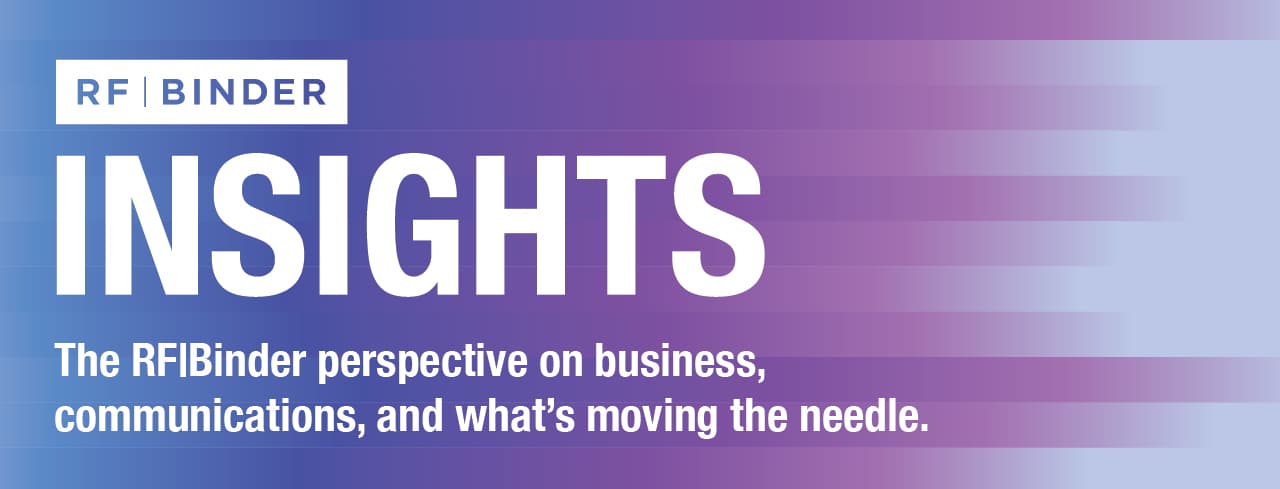Last week we got to attend Fintech week in New York. The city was buzzing with innovators, forward-thinkers, solution providers and hungry entrepreneurs seeking to make an impact with potential clients, partners and investors. Many panel discussions and conversations were centered around Artificial Intelligence (AI) and Machine Learning (ML) and its impact on the financial services sector. These two topics continue to generate intrigue and excitement across the marketing and communications landscape as hungry marketers want to gain insights (and the advantage) into the latest AI tools that will help add value to their daily jobs while also enhancing their company’s reputation, visibility and innovation.
At RF|Binder, we’ve embraced the intersection of AI, ML, and In-Person Communications. We have our own AI task force team that stay on top of the latest developments in AI — while not on the same scale as Chase Bank’s 2,000 AI and ML experts, as JPMorgan Chase CEO Jamie Dimon states, “technology has the potential to augment virtually every job.” We agree with this perspective and believe that having a dedicated team focused on the rapid evolution of AI can contribute a competitive edge to any company. However, it’s crucial not to overlook the importance of integrating AI and ML initiatives into a comprehensive brand, marketing, and communications strategy to optimize stakeholder engagement. Our focus during Fintech Week was to observe how both established financial institutions and Fintech companies were navigating this landscape. Below, we’ve outlined several key themes highlighting the significant impact of AI and ML on organizations and the imperative for these companies to integrate these efforts into a cohesive strategic communications plan.
Improved Security and Fraud Detection: Empowering Your Communications
AI-powered fraudsters and cybercriminals certainly present a serious threat to financial institutions and banks have been told by the US Treasury to expand their risk management to cover AI. However, amidst these challenges, AI and ML also offer substantial opportunities for financial services to bolster their capabilities in fraud detection and prevention, as illustrated by Visa’s recent AI-powered fraud prevention tools. By analyzing vast amounts of data in real-time, these technologies can identify suspicious patterns and anomalies that would be nearly impossible for human analysts to detect. This not only protects customers from financial losses but also helps financial institutions maintain trust and credibility in the eyes of the public. As communications consultants, we can leverage these advancements to reinforce our client’s messaging around the institution’s commitment to security and customer protection, further strengthening their relationships with key stakeholders.
Personalized Financial Advice and Products: Complementing In-Person Interactions
AI and ML are also revolutionizing the way financial institutions provide investment advice and develop new products. By leveraging vast troves of customer data, these technologies can deliver highly personalized recommendations and solutions tailored to individual needs and risk profiles. While this can significantly improve the customer experience, it’s crucial to remember that financial decisions often involve complex emotional and psychological factors. Being in the business of relationship-building, we don’t underestimate the importance of in-person consultations and face-to-face interactions, particularly with financial advisors who can provide the human touch and empathy that customers crave, complementing the personalized insights generated by AI and ML.
Streamlined Customer Service and Engagement: Enhancing, Not Replacing, Human Connections
Another area where AI and ML are transforming financial services is in customer service and engagement. Chatbots and virtual assistants powered by these technologies can provide quick and efficient responses to customer inquiries, freeing up human agents to focus on more complex tasks. However, it’s important to strike a balance between the convenience of AI-driven customer service and the value of human-to-human interactions. Customers often seek a personal connection and the ability to speak with a real person, especially when dealing with sensitive financial matters. I know I’ve had my fair share of bad chatbot experiences that have tainted my impression of a brand – leaving me frustrated and wanting to talk to a “real-human” (I know many of you will be nodding in agreement). By integrating AI and ML into our communications and marketing strategies, you can enhance the customer experience while preserving the human touch that fosters brand trust and loyalty.
Navigating the Ethical Considerations: Prioritizing Transparency and Accountability
As AI and ML become more prevalent in financial services, it is crucial for communications and marketing professionals to navigate the ethical considerations surrounding these technologies. Issues such as data privacy, algorithmic bias, and transparency in decision-making must be addressed to maintain public trust and ensure that the benefits of these technologies are equitably distributed. Our advice to financial institutions is to proactively communicate your institution’s commitment to ethical practices and responsible use of AI and ML. This way you can build stronger relationships with your customers and the broader community.
In the rapidly evolving landscape of financial services, AI and ML stand out as transformative forces reshaping the industry. These cutting-edge technologies bring enhanced fraud detection, personalized investment advice, and streamlined customer service, fundamentally altering how financial institutions interact with their clientele. Yet, as marketing and communications professionals, it’s paramount to acknowledge that while AI and ML can greatly enhance strategic initiatives, they should complement rather than replace the significance of in-person connections and human-centric interactions. Effectively communicating how businesses integrate AI and ML into their operations requires thoughtful messaging that underscores the value of technology while emphasizing the continued importance of personalized engagement.
Interested in learning how to put these insights into action? The financial services communications team at RF|Binder are experts in delivering innovative communications solutions across financial services, capital markets, financial technology, traditional and alternative asset management and more. Get in touch today!

